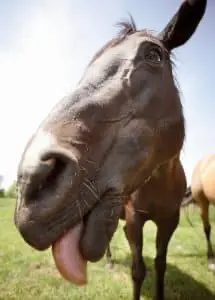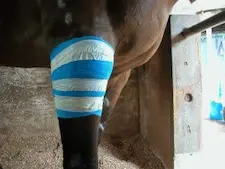For years everybody’s been waxing lyrical about the benefits of coconut oil and the number of different applications it has, from conditioning your hair and improving your skin to increasing your athletic prowess, but you might be surprised to find that it can have exactly the same benefits for your horse. For years I’ve been using it at the yard and am still blown away by the range of uses it has, which is why I decided to write this article.
As well as being a miracle product, if you buy oil that has been picked, pressed and packed at source (often marked with the Fair Trade logo), it’s sustainable and eco-friendly too. As you can guess, ‘picked, pressed and packed at source’ means that all of the production happens in the same place. This is not only good for the environment and has a lower carbon footprint but it also means that the money will go directly to the communities that grew it in the first place.
Improving your horse’s gut health
Coconut oil is much easier for a horse to digest, absorb and then convert to energy. It’s sometimes used to help with the treatment and prevention of ulcers, colic, and acidosis although more research needs to be done into this.
Why it works: If you remember anything from biology at high school you’ll probably remember that the fat we eat is normally a form of fat known as triglyceride (which is made up of 3 fatty acids) and is categorized as short, medium, or long-chain which describes the length of the fatty acids. Medium-chain triglycerides (or MCT) are much easier to digest which therefore means that they’re absorbed into the bloodstream much faster and as a result are converted to energy far quicker.
Great source of ‘cool’ energy
Coconut oil contains twice as much energy as protein and starch but because it’s a fat it’s a non-heating energy source.
Why it works: The body will break down fat in coconut oil more quickly than most other oils which mean it’s used as fuel (energy) rather than glucose. This also means that less lactic acid is produced which also helps the horse to recover faster too. Also because the fats are converted to energy so quickly there’s nothing left to make the horse hot which is one of the reasons why coconut oil is better than high grain feeds.
Good for fussy eaters
If your horse doesn’t like taking medicine or eats around any supplement then hiding them inside some coconut oil will help. Just wrap the tablet or powder up inside a little bit of coconut oil and your horse will eat it without batting an eyelid. You can even use this to make deworming easier, just put a little in an old worming syringe and give it to your horse as a treat occasionally. He’ll then associate the syringe with the oil rather than the wormer.
Why it works: Coconut oil is not only sweet-tasting and highly palatable but it has a scent that can disguise the smell (and taste) of pretty much any medicine. Your horse will think it’s a treat instead and tablets will no longer be a problem.
Ideal for hard keepers
If your horse finds it difficult to gain weight or to keep the weight, whatever the reason, then coconut oil is a healthy alternative to calorie supplements and feeds.
Why it works: The way that the body absorbs and utilities fatty acids means that they’re perfect for hard keepers. Coconut oil is often cheaper than hay too so adding it to your horse’s feed can make the hay last longer.
Increase immunity
Adding a little bit of coconut oil to your horse’s diet will help to boost his immunity which will help him to fight off infections.
Why it works: Two of the fatty acids that coconut oil contains are capris acid and lauric acid, both of these have anti-bacterial and anti-viral properties that will help to keep your horse’s immune system healthy.
Treating wounds
Covering an open wound with coconut oil will act as a barrier against infection but will also help to minimize proud flesh. This is where the new connective tissue and blood vessels have grown over the wound and can have the appearance of a pink cauliflower.
Why it works: Coconut oil has a high concentration of a fatty acid known as monolaurin, which is known for its natural antimicrobial benefits.
Treating mud fever
As well as the antimicrobial benefits that make it so good for treating wounds it’s also ideal for treating mud fever and preventing reinfection.
Why it works: As well as having antimicrobial values it also has anti-viral and anti-fungal properties. These not only help the area to heal but can stop fungus growing and causing the area to become reinfected.
Ease bites and stings
Applying a thin layer of coconut oil to the bite or sting (after the sting has been removed) will not only protect it from foreign bodies such as dust and bacteria but will also help to soothe it and stop your horse from scratching the bite or sting.
Why it works: Coconut oil has anti-bacterial properties that will protect the area from any germs but its also absorbed into the skin quickly which works to help the area heal quickly and therefore not itch.
Adds condition to the coat as well as the mane and tail
Feeding coconut oil to your horse will help to improve the condition and shine of his coat as well as his mane and tail but you don’t need to feed it to your horse, if you’d prefer to, you can use it directly on his coat. A tiny amount used directly on the mane and tail can also help to detangle them.
Why it works: Petroleum-based conditioners tend to ’sit’ on top of the horse’s coat and give them shine but because coconut oil isn’t petroleum-based (rather fatty acid-based) it will be absorbed through the hair and into the skin. Once it’s absorbed the vitamin E in the oil will help to soften the hair and moisturize the skin.
Moisturize your horse’s hooves
If your horse’s hooves are dry and cracked then massaging a little bit of coconut oil into them every day will help to repair the hooves.
Why it works: A lot of hoof conditioners are petroleum-based which means they’re actually more likely to dry the hooves out. Coconut oil, on the other hand, doesn’t contain any petroleum at all and is quickly absorbed through the hoof wall, getting right to the source of the problem.
How should I give my horse coconut oil?
There are no hard and fast rules about how to feed coconut oil, some people prefer to use it purely as a treat while others add it to the daily feed, and then, of course, there are people who do a little bit of both.
If you’re adding it as a food supplement you can either add it as a solid or warm it up (even microwaving it for a few seconds) and mix it with the feed, if you do warm it up though make sure it’s not too hot before giving it to your horse. When it comes to feeding it as a treat you can use it as a paste in a syringe or use it as a ‘lick’, although you won’t be able to do this if the temperature is too warm.
When you’re using coconut oil for the first time don’t suddenly start feeding your horse a lot. He won’t be used to it so instead start by feeding him a small amount and then increase it slowly. Every horse is different so there’s no set amount you should be feeding, instead monitor your horse, and if you think he’s having too much reduce it. The daily guide below should help though:
- Competition horses
50ml to 100ml - Pleasure horses
30ml to 50ml - Old horses
15ml to 30ml
What to look for when buying coconut oil for horses
Yes, of course, you could just walk into any grocery store and pick up a tub of coconut oil and it would definitely benefit your horse but there are a few things you need to look out for when buying oil.
- Make sure you buy ‘virgin’ – Most oils (whether olive or coconut) are available as regular (sometimes called pure, classic or refined), virgin, or extra virgin but when it comes to coconut oil for horses its important to make sure you buy virgin oil. The reason for this is because virgin coconut oil contains at least 45% lauric acid. This a fatty acid that gives the oil its plethora of health benefits.
- Only buy cold-pressed – Heat during the production phase can negatively affect the taste of the oil so to keep it highly palatable to horses it’s better to opt for cold-pressed oil. This literally means just that, the oil has been squeezed (or ‘pressed’) out of the coconut flesh.
- Buy picked, pressed and packed at source – As I mentioned before if you by oil that is labeled as picked, pressed and packed at source (or labeled Fair Trade) then it’s more sustainable and eco-friendly. It’s also more ethical because the money goes directly to the communities that produced it rather than to a multi-national bio-chemical company.
An added bonus
Coconut oil won’t go off so it can be kept for years and will still be perfectly okay to use. Okay so I admit that’s of no benefit to your horse but it’ll certainly help your pocket if you don’t need to replace it every few months.
Further reading
- Caring for an old horse
- Managing arthritis in horses
- Treating ulcers naturally
- Keeping a horse at home
- Feeding a hard keeper on a budget
- Feeding a horse with no pasture
- Do horses need supplements?
- Healthy treats for horses
- Is your horse healthy?
- What are your horse’s teeth telling you?
I hope you found this article helpful. If you did I’d be grateful if you could share it please as it would really help me.
Recommended products
Over the years I have tried hundreds of different horsey products, from various blankets and halters to different treats. Some I’ve loved, others I’ve hated but I thought I’d share with you my top all-time favorite products, the ones I never leave the yard without. I’ve included links to the products (which are in no particular order) that I really think are great.
- Horse Knots by Reference Ready – If you’re like me and enjoy pocket reference guides then you’ll love this knot tying guide. These handy cards can easily fit in your pocket or attach to the saddle for quick reference. They’re waterproof, durable and are color coded to make them easy to follow.
- Mane ’n Tail Detangler – Even if you never show your horse you’ll need to detangle his tail from time to time (and possibly his mane too) which is always a challenging chore! I’ve found that if I run a little bit of detangler through my horse’s tails every few days it stops them from getting matted up and makes combing them easy, even if they’re coated in mud. I don’t know if I should admit to this or not but it also works wonders on my hair.
- TAKEKIT Pro clippers – Over the years I’ve tried a lot of different clippers and while some were obviously better than others I found these to be by far the best. They are heavier than a lot of other clippers but for me, that’s a good thing, it makes them feel more sturdy and hardwearing. On top of that they have a range of speeds so are just as good for clipping your horse’s back as they are his face. I also like the fact that they come in a handy carry case but that’s not for everybody. The company that makes them is super good and incredibly helpful too, a real bonus these days. The only thing I wasn’t keen on was the fact that it doesn’t come with any oil, but that’s not a major problem as it’s not difficult to buy lubricant.
- Shire’s ball feeder – There are so many boredom buster toys out there but I like to use these every day, regardless of whether or not my horses are bored. I find that it helps to encourage my horses to problem solve by rewarding them with treats (or pieces of fruit) but it also mimics their natural grazing behavior which helps to keep them calm and de-stressed.
- Horse safe mirror – This is a strange one that many people are surprised about but I like to put horse safe mirrors in the trailers as well as in the quarantine stalls. It helps to prevent the feeling of isolation by giving the impression of other horses being around. Being herd animals horses can get extremely stressed when they feel that they’re on their own but with these stick-on mirrors, they believe that at least one other horse is with them.
- Rectal thermometer – I know this isn’t glamourous at all but it’s vital for your horse’s well-being to be able to check their temperature and a rectal thermometer is the easiest way of doing this which is why I’ve added it to the list.
Shopping lists
I’ve also put together a few shopping lists of essential items that I’ve found helpful over the years. I’ve broken the lists down into different categories rather than put everything in one massive list 😉





